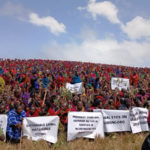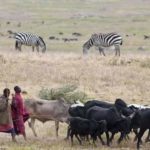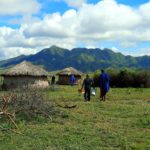From L-R: Edward Porokwa, PINGOs Forum, Tanzania; Kittisak Rattanakrajansgsri, AIPP; Tunga Bhadra Rai, NEFIN; Joseph Ole Simel, MPIDO, Kenya; and Kamira Nait Sid, CMA ©IISD
Presented by Asia Indigenous Peoples Pact (AIPP), the International Work Group for Indigenous Affairs (IWGIA), Tanzania Indigenous Peoples Taskforce on Climate Change (TIPTCC), Pastoralists Indigenous Non-Governmental Organizations Forum (PINGOs Forum), Congrès Mondial Amazigh (CMA), Nepal Federation of Indigenous Nationalities (NEFIN) and Mainyoito Pastoralists Integrated Development Organisation (MPIDO)
This side event, moderated by Kathrin Wessendorf, IWGIA, aimed to promote solutions to maximize adaptation efforts and interventions through integration of Indigenous Peoples’ knowledge.
Kamira Nait Sid, CMA, provided an overview of traditional practices and knowledge of the Amazighen people (Berbers) relevant to climate change, an ethnic group indigenous to many countries of North Africa. Proposing to create a database of traditional knowledge open to all humankind, she focused on their calendar divisions linked with agricultural practices, cultivations’ rotation and spiritual connection with nature.
Kittisak Rattanakrajansgsri, AIPP, focused on the holistic land use and livelihoods system of Indigenous Peoples as a means to adapt to climate change. Using a case study from the Huay Hin Lad Nai community in Thailand, he addressed, among others: categories of land types and land use; rice cultivation practices; and mixed farming. He concluded that the way the community uses resources reflects their intricate knowledge of the different ecosystems within their territory.
Edward Porokwa, PINGOs Forum, Tanzania, noted that addressing climate change in East Africa is a matter of state policies with little regard for indigenous knowledge and existing livelihoods. Pointing to the negative perceptions of pastoralism, he underscored that Indigenous Peoples’ knowledge needs to be integrated into policy making and implementation of climate change actions.
Stressing that climate change is mainly felt at the household level thus making women critical agents, Joseph Ole Simel, MPIDO, Kenya, said that Western influence has “undermined and crushed” the traditional knowledge of many Indigenous Peoples. Underscoring the need for a link among the broad principles of the Paris Agreement and the realities of people on the ground, he urged bringing traditional knowledge and women to the center of the discussion.
Noting that indigenous knowledge is key to combatting climate change and underscoring the need to protect Indigenous Peoples’ rights, Tunga Bhadra Rai, NEFIN, said that the production and reproduction of social, cultural, political and environmental values of Indigenous Peoples are embedded in their local environment and nature.
During discussions, participants addressed, inter alia: the ratification process of the UN Declaration on the Rights of Indigenous Peoples (UNDRIP); the relationship between scientific research and traditional knowledge; and ways to further recognition of Indigenous Peoples’ rights.
Source: International Institute for Sustainable Development Reporting Services





